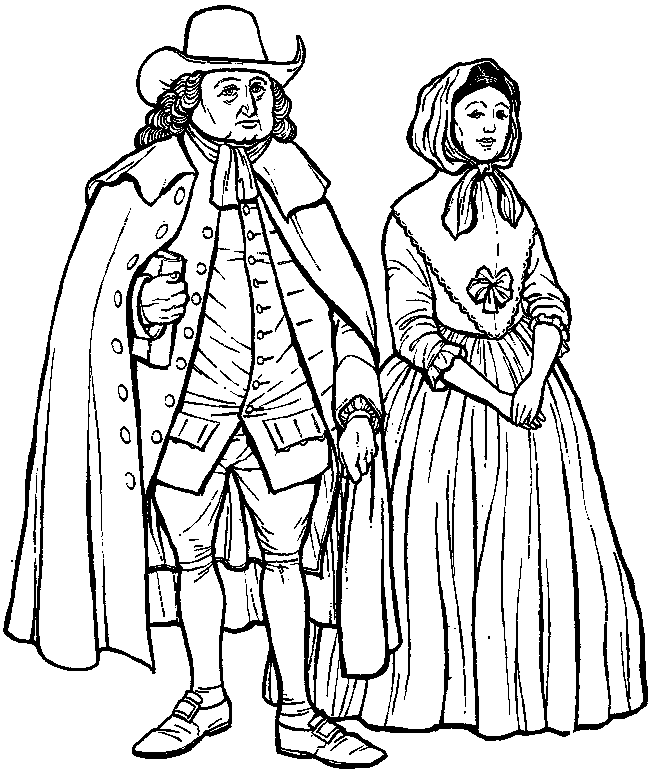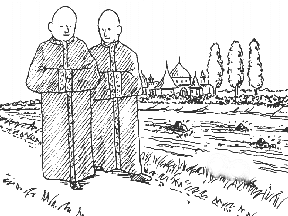
(Matthew 16:13-23)
May these words of this Peter be like a rock,
not a stumbling block!
|
|
"Who do you say
that I am?" Jesus asked. Simon Peter answered, "You
are the Messiah, the Son of the living God." And Jesus
answered, "Blessed are you, Simon son of Jonah! ... You are
Peter (petros), and on this rock (petra)
I will build my church..." Jesus then began to speak of
the rough road ahead. And Peter took him aside and rebuked him... "Get
behind me, Satan!" Jesus replied. "You are a stumbling
block..." (Matthew 16:13-23) May these words of this Peter be like a rock, |
"Bless the Lord!"
Message preached September 22, 2002
Long Green Valley Church of the Brethren
Glen Arm, Maryland USA
based upon Psalm
103:1-22
There is a
delightful scene (one among many) in this summerís film, "My
Big Fat Greek Wedding" in whic h
the main character first meets the man with whom she will eventually fall in
love. Going through a faze in her life she later describes as "frump
girl," something about this fellow so grasps her attention that all she can
do is stare at him. "Brain freeze" is what she calls that awkward
moment of silence when she canít think of a thing to say, continuing to stare
at this attractive, smiling guy. Later on in that same scene, as well as the
next time they meet through a storefront window, she slides down and tries to
hide, almost on her knees. The rest of this movie - one I highly recommend -
tells the hilarious story of how they get together.
h
the main character first meets the man with whom she will eventually fall in
love. Going through a faze in her life she later describes as "frump
girl," something about this fellow so grasps her attention that all she can
do is stare at him. "Brain freeze" is what she calls that awkward
moment of silence when she canít think of a thing to say, continuing to stare
at this attractive, smiling guy. Later on in that same scene, as well as the
next time they meet through a storefront window, she slides down and tries to
hide, almost on her knees. The rest of this movie - one I highly recommend -
tells the hilarious story of how they get together.
"Brain freeze" - that awkward moment of silence when you donít really know what to say or do. Might this not be one way of describing that moment when worship truly becomes worship? Worship, after all, isnít really about what we say or do - the words we use, the type of music we employ, the things that we do to praise the Lord. Itís something much more than "us," isnít it? When we encounter our Creator, who isnít merely some nice guy we meet in a Greek restaurant, itís natural to go through something like a "brain freeze." We might even, literally or figuratively, slide down and try to hide, almost on our knees.
Which makes sense. Psalm 103 begins with the phrase "Bless the Lord!" The Hebrew word translated in this first verse as "bless" literally means to "get down on your knees." Of course, it means much more than that, but I wonder if this isnít a good place to begin as we come to understand what worship is. When I say "understand," I donít mean "comprehend with our intellect." Instead, I intend to "stand under," to approach this central act of Godís people from the perspective of being on our knees - not from some lofty position where we can objectively and dispassionately observe and thus not get involved.
Now, I confess that when I think of these words, "Bless the Lord, O my soul, and all that is within me, bless his holy name," I go through a moment of "brain freeze." I mean, what exactly do those words mean? What does it mean to "bless the Lord" ? We could say that itís the act of speaking our praise to God, and we would be partly right. However, it is more than speech, more than just words, isnít it? Yes, "all that is within me" with which I am to "bless his holy name" can refer to the capacity of my lungs and diaphragm to propel sound coupled with the ability of my mind to think of the appropriate words. This, though, is only a part of it.
To
"bless the Lord" involves a sense of being on your knees and
speechless before an awesome, holy God. Call it "brain freeze," if you
will. Perhaps better would be to think of it as a clearing away of the inner
clutter that gets between us and God. And there is so much "clutter,"
isnít there? Since worship began this morning, has anyone been thinking about
what youíre going to be doing later on today? Perhaps youíve been at work on
a mental "to do" list. Or maybe your thoughts, if not  some of your
actions, have wandered to the person next to or down from you - possibly someone
of the opposite sex.
some of your
actions, have wandered to the person next to or down from you - possibly someone
of the opposite sex.
When our family took a field trip to Philadelphia last Spring, we stopped in the old Quaker meeting there, where a tour guide explained a few things about where they met for worship. A humorous note came when she explained about the boards that were intentionally put up long ago on the stairs leading to the balcony. These, she said, were there then to prevent the young men from eying the ankles of the young ladies as they ascended, thus distracting them from worship. It might take more than a few boards to do the same thing in this day and age.
Our own background as Brethren has similar stories which lead in the same direction - tending to that which distracts us from what is most important. The plain dress of our ancestors was intended to help Godís people focus on the essentials, and not be distracted away from God. Is it just being "old fashioned" to encourage us today to consider what we wear to church in a similar way? Did we come today to worship the Lord, or to show off our own individuality? There is, as I said, much that clutters our inner self - things needing to be cleared away.
Two monks
were  walking
along a medieval path when they came to a shallow river. On the bank stood a
pretty, young woman who was seeking a way across. One of the monks told her to
climb on his back and he carried here across. Then they parted, and the two
monks continued their journey. Later that evening, the other monk could stand it
no longer and complained to his brother, "how could you have broken your
vows and picked up that woman?" After a while the other replied. "I
put her down on the other side of the river. Apparently you are still carrying
her with you."
walking
along a medieval path when they came to a shallow river. On the bank stood a
pretty, young woman who was seeking a way across. One of the monks told her to
climb on his back and he carried here across. Then they parted, and the two
monks continued their journey. Later that evening, the other monk could stand it
no longer and complained to his brother, "how could you have broken your
vows and picked up that woman?" After a while the other replied. "I
put her down on the other side of the river. Apparently you are still carrying
her with you."
To "bless the Lord" involves a clearing away of the clutter, a sort of "brain freeze," such that space is created within us for something more important. Confession is a part of this, letting go of that which weighs us down, recognizing that before this awesome, holy God - well, we are not ourselves very holy, let alone awesome. We slide down to our knees, literally or figuratively, before the Lord. The important part of confession, however, is not that we remember our sins, is it - that we continue to hold on to them? No, in confession we release them into the hands of the One who died to set us from them.
Clearing away the inner clutter, thatís what worship involves, what "blessing the Lord" means, but that isnít the whole picture. Psalm 103 fills in some of the rest. After those wonderful words over which I experience a bit of "brain freeze:" "Bless the Lord, O my soul, and all that is within me, bless his holy name;" it then calls us not to forget, but to remember. What are we not to forget? Are we supposed to remember our sins? No, not once weíve released them. Why clutter our lives back up? Why continue to carry that heavy burden?
Having
cleared away the inner clutter, we "bless the Lord" by
remembering "all his benefits." As another paraphrase of these
words puts it, "donít forget a single blessing!" (The
Message). Remember. Focus away from self, focus onto God. He
forgives your sin. He heals your diseases. He redeems you from hell. He crowns
you with love and mercy. He wraps you  in goodness. He renews your youth.
in goodness. He renews your youth.
Remember all of that to the core of your being. Donít just stuff it in your brain. Live and breathe Godís blessing. Let it lie at the pit of your stomach. I donít wish to make like of such things, but imagine what might happen if more of us more often allowed this to sink into our digestive system? Might we put "Tums"ģ, or the makers of those other antacid medications, out of business? "Let all that is within me bless his holy name." From head to toe. Not just my mind, but my heart, soul, and strength.
By adding those last words, we remember what Jesus said, which was but a reiteration of what God spoke through Moses long before him. Is "blessing the Lord" different from "loving the Lord your God?" (Deuteronomy 6:5, Matthew 22:37, Mark 12:30, Luke 10:27). "Let all that is within me bless his holy name." I want to love God with every fibre of my being.
In many ways, itís appropriate that I began this message with that movie illustration. Worship, which isnít something that stops once the postlude ends and we exit this room, is a love story. Itís also a comedy, believe it or not. In "My Big Fat Greek Wedding," there is an altogether crazy family that needs to be accepted, and lived with, and appreciated, and loved. Guess what? Worship is a package deal. It comes complete with a crazy family. Read the Bible if you donít believe me. Itís the story of one crazy family. In worship, we remember this story - for itís Godís story, Godís family. We laugh, we cry, we hope, we dream - with God. Because this family is now our family. Not only are we forgiven and set free from our sins in Jesus Christ, but in him God has adopted us into his family.
Iím
thinking now of that crazy family called "the church." Worship - you
see - is something we do together, not separate. Even when we enter our own
inner sanctuary and "bless the Lord" in a personal way on our own
time, we are still in the framework of the larger family. Even so, our focus is
upon the fact that it is Godís family - not just our own. We "bless the
Lord" from the depths of this "body," the "body of
Christ," the church, not just our own body. Whether it be the
"body" of the c hurch, or the vessel which contains our personal heart,
soul, and mind, this "body" belongs to God. As the apostle Paul wrote,
hurch, or the vessel which contains our personal heart,
soul, and mind, this "body" belongs to God. As the apostle Paul wrote,
"We do not live to ourselves, and we do not die to ourselves. If we live, we live to the Lord, and if we die, we die to the Lord; so then, whether we live or whether we die, we are the Lordís" (Romans 14:7-8).
Such an under-standing lies at the heart of worship. Itís about God, not us. Never fear, however. Trust in the mercy and grace of your Creator. The Lord is "slow to anger and abounding in steadfast love" (103:8b). God doesnít remember our sins once we have released them to him. "As far the east if from the west (or as sunrise is from sunset - The Message), so far he removes our transgressions from us" (103:12). Having created us, God knows that the days of our lives are brief. "Godís love, though, is ever and always, eternally present to all who fear him" (103:17 - The Message); that is - to all who can only just stand and stare when we come into Godís presence; who know what "brain freeze" is all about when it comes to our awesome, holy Lord; who long to "bless his holy name" with all that is within us.
Well, now, you "crazy" family of God, you "characters" of the Lord, letís sing a song of praise. Yes, I know, itís an old hymn, though in the longer view you could say it was written only yesterday. And yes, I know, we already sang another one like it earlier which put the words to the 103rd Psalm to music. So what? Letís do it again. "O bless the Lord, my soul! Let all that is within me join, and aid my tongue to bless his name..." #600.
| online resources for this scripture text |
For commentaries consulted, see Psalms. |
©2002 Peter L. Haynes